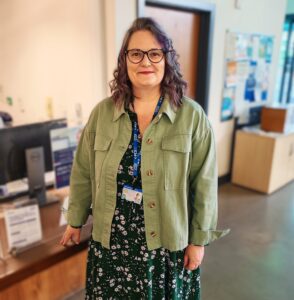The Impact of ARRS Roles on reducing pressure on general practice and improving patient care
Allied Health Professional Clinical Manager at Primary Care Sheffield and previous Additional Roles Reimbursement Scheme Project Manager for South Yorkshire Dr Natalie Jones talks about her research into the patient experience of the Additional Roles Reimbursement Scheme (ARRS). Several themes emerged during the research: patients talked about staff members’ professionalism and knowledge of local communities and access to services – and their ability to signpost and advocate for patients.
Through the ARRS scheme, primary care networks (PCNs) can also recruit for 17 other roles within their multidisciplinary teams – including social prescribers, dieticians and clinical pharmacists – to meet the needs of their local populations.
Tailoring Teams to Local Needs

Dr Natalie Jones
One of the strengths of the ARRS model is its flexibility. Each PCN decides which roles to recruit based on the needs of their population. For example, in areas with a high prevalence of diabetes, a dietitian may be employed to support lifestyle and medication management. In communities with older, frail populations, paramedics or Occupational Therapists can provide vital support. Many areas are also investing in care coordinators, health coaches, and social prescribers to address wider determinants of health.
This tailored approach ensures that care is not only clinically effective but also culturally and socially relevant.
Listening to Patients and Carers
In interviews with patients and carers, many described how ARRS professionals brought not just clinical expertise, but also empathy, encouragement, and a sense of connection. These roles often provided the time and space for patients to talk about their worries, receive emotional support, and feel motivated to make positive changes.
One patient, Emma, shared how a Social Prescriber and Health and Wellbeing Coach helped her overcome isolation and anxiety. With their support, she began volunteering, attending community groups, and participating in physical activity. “My life is full now,” she said. “I’m making up for lost time.”
Another patient, John, who had recently experienced bereavement, said, “Without these people here, I wouldn’t be here—I would be six feet under.” His story reflects the vital emotional scaffolding these roles can provide during life’s most difficult moments.
Advocacy and Signposting
ARRS professionals are also playing a crucial role in helping patients navigate complex systems and access the support they need. This includes signposting to community services, advocating with housing or social care providers, and coordinating care across multiple agencies.
Hamza, a patient living in poor housing conditions with his young family, described how a Care Coordinator persistently advocated on his behalf. “She just wouldn’t stop,” he said. “She went everywhere until something was done to help us.” Her efforts led to essential repairs and improved living conditions for his family.
These stories highlight how ARRS roles are not only improving health outcomes but also addressing the wider social determinants of health.
Key Metrics for Success in ARRS
While patient stories are powerful, it’s also important to measure the impact of ARRS roles through clear metrics. Based on the evaluation and wider NHS goals, key indicators of success include:
- Improved Access to Care: Reduced waiting times and increased appointment availability through role diversification.
- Patient Satisfaction: Positive feedback on care quality, emotional support, and continuity of care.
- Health Outcomes: Improvements in clinical indicators (e.g. HbA1c levels in diabetes), mental health, and physical activity.
- Reduced GP Workload: Redistribution of tasks allowing GPs to focus on complex cases.
- Care Coordination: Enhanced navigation of services, especially for vulnerable or non-English speaking patients.
- Prevention and Self-Management: Increased uptake of community-based activities and self-care strategies.
- Equity of Access: Tailored support for underserved populations, addressing health inequalities.
A logic model developed during the evaluation also outlines six domains of impact—ranging from clinical outcomes to system efficiency—which can guide future data collection and service development.
Looking Ahead
The ARRS scheme is still in its early stages, but the evidence so far is promising. Patients are receiving more personalised, accessible, and holistic care. GPs are able to focus on complex cases, supported by a diverse and skilled team. And communities are beginning to see the benefits of a more integrated, proactive approach to health and wellbeing.
If we continue to invest in these roles – embedding them more deeply into primary care systems – we can build a future where healthcare is not only more efficient but also more compassionate and inclusive
For more information about ARRS roles and the multi-disciplinary team visit: NHS England » Expanding our workforce
